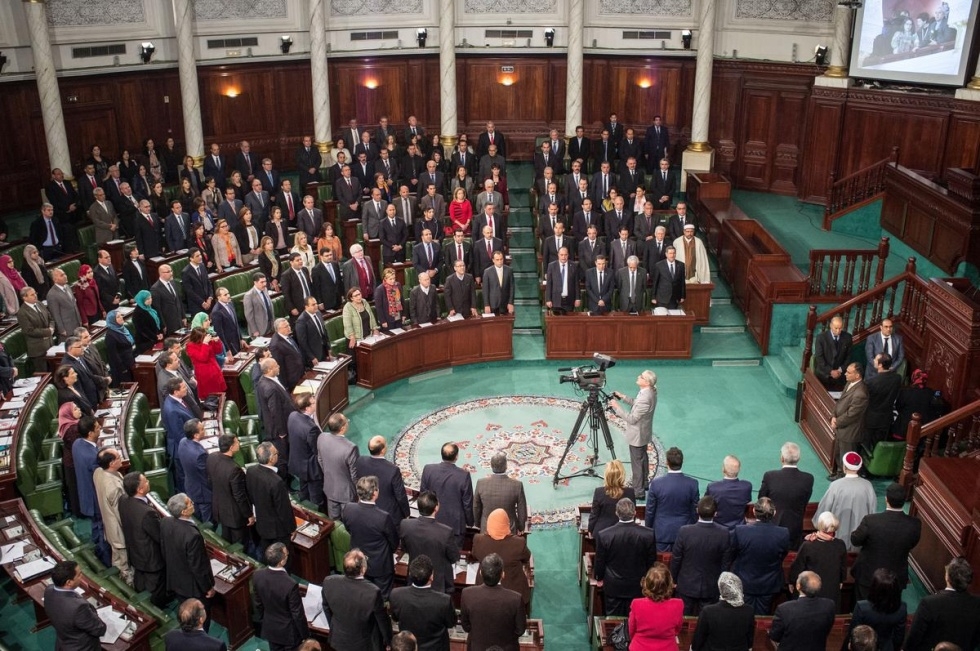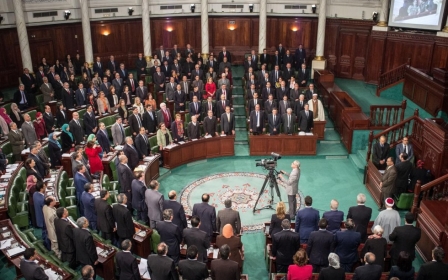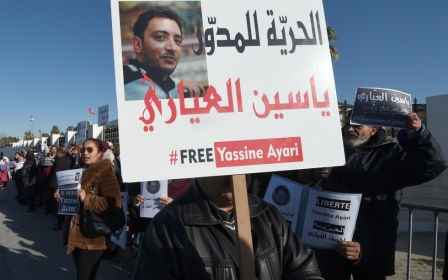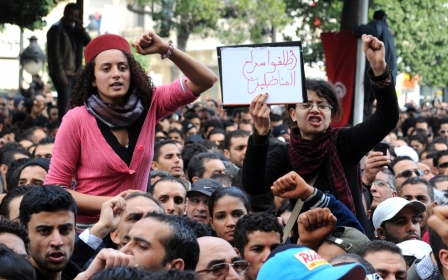Tunisia: A democracy and a police state?

Compared to other countries affected by the 2011 social uprisings, Tunisia is the only one that has managed to find its way through transition with minimal cost and significant achievements. A progressive constitution was adopted, elections for a National Constituent Assembly (in 2011) and subsequently parliament and presidency (in 2014) were completed, and political dialogue is vibrantly taking place and still employed as the main way to resolving the political and social tensions between the country’s elites. None of this, however, is reflected in the performance of the police apparatus that continues to operate through the old days’ doctrine of power-abuse.
Consensus, political diversity and the distribution of power
When the political crisis reached a peak domestically and the other “Arab spring” countries took a cataclysmic course, Tunisia’s four major civil society organisations - the trade union (UGTT), the employers’ union (UTICA), the National Bar Association, and the Tunisian League of Human Rights (LTDH) - mediated a National Dialogue that started in October 2013 and lasted throughout 2014. The dialogue first led to the peaceful transition of power from an Ennahdha-led government to a technocratic cabinet and then to the organisation of parliamentary and presidential elections at the end of 2014. Despite claiming to represent virtually all political sensitivities in Tunisia, the talks were essentially between the two largest political forces: Nida Tounes and Ennahda. The former party represented traditional members of the state elite (though Nida Tounes contains multiple tendencies, including liberals, conservatives, leftists and nationalists) and the latter represented the new layer of elite: pragmatic “Islamists” who emerged during the first phase of transition.
The undeclared purpose of the dialogue was to surmount mutual suspicions between these two, and overcome the clash-inducing narrative evoking dualism between the Ancien Regime and the Revolutionaries.
Rached Ghannouchi, the leader of Ennahda, came forward as the main driving force, approaching both camps with a rhetoric eliciting the indispensability of recurring to negotiations and concessions. He championed “peacefully settling our Tunisian-Tunisian political disagreements”, a strategy he realised when he flew urgently to Paris on 15 August 2013 to visit Nida Tounes’ founder Mr Beji Caid Sebsi while he was hospitalised there, in what is today referred to between Tunisians as “the Paris meeting”.
The tactic gradually dragged both the (non-militant) sides - i.e. religiously-minded and non-religious revolutionaries on the one hand, and anti-Islamists and affiliates of the former regime on the other - to swallow the meeting’s central idea: consensus. The tactic also further confirmed the diverse, participatory nature of Tunisian politics. Today, there’s no better place to notice this diversity than in the parliament where seats are shared with relatively small differences between the two major parties: Nida Tounes (with 39 percent of the seats), Ennahdha (31 percent), in addition to the Free Patriotic Union (populists, liberals), Jebha Chabia (radical leftists and nationalists) and Afek Tounes (young liberals).
After the adoption of the constitution - which itself was drafted through a laborious process of consensus-making between different political groups - the call for consensus was coupled with a clear emphasis on preserving national unity. In fact, except for the militant jihadists who refer to the Quran as their sole constitution, most people in Tunisia today, be they religious or atheists, liberals or conservatives, have been able to identify with some aspects of the Tunisian constitution.
The inclusion of all of these diverse tendencies into the political spectrum represents a considerable shift away from the “one party, one ruler” regime model under Ben Ali, and is an asset for democracy building. But it, nevertheless, paid no service to tackle the deeper problems of corruption and absence of the rule of law and, especially, the undue powers of the police apparatus.
The parallel world of a police state
While politicians do their bargaining, the state police apparatus continues to manifest a built-in impulse for tyranny through daily brutalisation and gratuitous show of force against the citizenry without any clear signs the situation will change in the near or far future, especially now with the appointment of judge Najem Gharsalli – who critics accuse of being unfit for the post and not independent - at the head of the interior ministry. One recent argument in the city of Sousse between a policeman who was parking his vehicle in a non-parking zone and a lawyer who asked him to move his car ended with the officer slapping the lawyer. Upon finding out that the man was a lawyer, the officer then apologised, saying: “I’m sorry, I thought you were a regular citizen!” This captures the nature and persistence of corruption and police impunity, and crystallises the relationship between the Tunisian citizens and “security” officers today.
Further incidents of police abuse vary from mundane bullying and humiliation to death under torture in detention centres and prisons. Radhia Nasraoui, president of the Tunisian Organization Against Torture, pointed this out two weeks ago, affirming that “torture ... continued after the revolution and took a horrendous shape, through different methods and manners ... which varied from beating, electro-shocking, hanging from hands and feet, solitary confinement and verbal violence and humiliation”. Among the 400 reports of torture that Nasraoui said her organisation received from ordinary citizens after the revolution, about 10 resulted in death, including the well-known cases of Walid Denguir, Issam Marwani and Mohamed Ali Snoussi.
Worse than torture or the continuity of horrendous police practices is the support, defence and legitimisation such acts draw from the state itself, in particular the ministry of interior and at times even from society. To explain the death of Walid Denguir, for instance, the ministry of interior said that Denguir died due to “using drugs”. Regardless of the truthfulness of its claim, the ministry refused to comment regarding the clear marks of torture which were left on Denguir’s corpse.
The National Union of the Interior Forces Unions, one of many police unions established after the revolution, has gained particular influence and attention due to the routine appearance of its leaders on mainstream media. Its alarmist security-driven rhetoric is omnipresent in Tunisia, and this union has been at the forefront of challenging the new, democratic notion in Tunisia that police officers should be subject to the rule of law. For example, after a court in the southern governorate of Kasserine ruled that a police officer should be imprisoned for allegedly “mistakenly” killing 21 year-old Ahlem Delhoumi and her cousin 18-year-old Ons Delhoumi last August, the union reacted by demonstrating in front of the parliament. At their demonstration, union members held banners reading “A security officer in jail = support for terrorism”. This demonstration was, however, less dramatic than another one which took place some months before in Sousse, where the union demonstrated in front of another courthouse demanding the release of a cop for shooting a citizen with impunity. That demonstration turned into a three-day police siege on the courthouse and assault on the judges and personnel working there.
At the same time, peaceful citizens’ protests are shut down by the same unions. Recent incidents reflecting this include the attack of peacefully striking miners in the mining basin of Gafsa on 6 January, who according to the Tunisian Security Observatory, “were violently repressed” before they retaliated by “setting the city’s police station on fire”. A few days earlier, citizens in the city of Douz also met with violence when they took to the streets to protest the arrest of local activist Fouad Mansour. The observatory reported one of the protesters saying “My brother Fouad Mansour was arrested and accused [by the police] of being a ‘terrorist ... a police force broke into our house without presenting any legal warrant and terrorized my family. My brother was arrested, tortured in the police stations of Douz, Gabes and in Tunis. He was later released as the accusations were fabricated.”
The father of another young man arrested in the same protest describes: “My son was coming back from work on his motorcycle with his friend at 9:00 pm before they were stopped by a security patrol that physically assaulted him and stole 70 dinars and his watch, then fabricated a charge against him and now he’s in prison.”
A number of human rights activists and young political dissidents are also being sent behind bars for exposing the state’s internal dynamics of corruption. These individuals are arrested or imprisoned for minor acts, such as spraying graffiti messages, or writing a Facebook post. Yassine Ayari’s case is probably the one that brought most attention, but it is far from being the only one.
High ranking officials within the ministry of interior have previously outlined reasons to reject any substantial policies of reform based on the absence of political stability and the overall transitioning state of the country. Today as a new parliament and a government were admitted, no reform policies have been presented. Even worse, the parliament has confirmed the appointment of a new minister of interior who was actively implicated with defending corruption under the Ben Ali regime. This sends very negative messages regarding the intentions of the new regime to meaningfully reform Tunisia’s most problematic institutions, such as the ministry of interior.
Democratisation in Tunisia is clearly not as calamitous as it is in Syria, Egypt or Libya, but the situation in this country is still delicate enough to be reversed if access to power turns out to be an objective in itself rather than a means to change the reigning culture of corruption and impunity. Justified by a discourse of “fighting terrorism” - a discourse Tunisia’s pro-impunity security forces unions have self-servingly purveyed, this silencing and marginalisation of young human rights and anti-corruption activists could pass unnoticed in Tunisia and in the international community. Even worse, hopes for a credible and lasting democratic system could fade away if the outcome is nothing more than an illiberal “electoral democracy” in which institutions remain unreformed and freedom of expression is rescinded.
-Omar Belhaj Salah is a junior researcher on politics and history at the Free University of Berlin.
The views expressed in this article belong to the author and do not necessarily reflect the editorial policy of Middle East Eye.
Photo: The new Tunisian government has yet to tackle problems of corruption and absence of the rule of law and, especially, the undue powers of the police apparatus.
Middle East Eye propose une couverture et une analyse indépendantes et incomparables du Moyen-Orient, de l’Afrique du Nord et d’autres régions du monde. Pour en savoir plus sur la reprise de ce contenu et les frais qui s’appliquent, veuillez remplir ce formulaire [en anglais]. Pour en savoir plus sur MEE, cliquez ici [en anglais].





